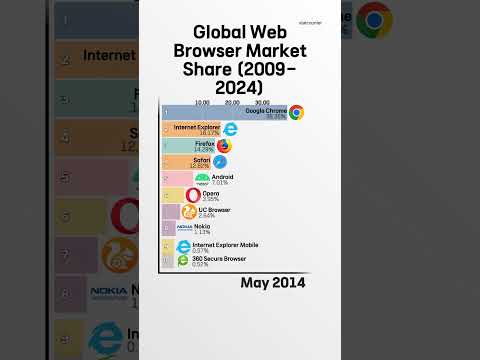
The Ultimate Guide to the Top Web Browsers: Comparing Features, Security, and Market Dynamics
- Market Overview
- Emerging Technology Trends
- Competitive Landscape Analysis
- Growth Forecasts and Projections
- Regional Market Analysis
- Future Outlook and Innovations
- Key Challenges and Opportunities
- Sources & References
“Introduction Artificial Intelligence (AI) in the European Union is at a pivotal moment, with new regulations poised to take effect, major investments underway, and debate intensifying around how to balance innovation with oversight.” (source)
Market Overview
The web browser landscape in 2025 continues to be dominated by a handful of major players, with a few emerging challengers making notable gains. According to the latest StatCounter data (June 2024), the top 10 web browsers by global market share are:
- Google Chrome
- Apple Safari
- Microsoft Edge
- Mozilla Firefox
- Samsung Internet
- Opera
- UC Browser
- Brave
- Vivaldi
- DuckDuckGo Browser
Market Share Highlights:
- Google Chrome remains the clear leader with approximately 63% global market share, thanks to its speed, extensive extension ecosystem, and seamless integration with Google services.
- Safari holds about 19%, driven by its default status on Apple devices and ongoing improvements in privacy and energy efficiency.
- Microsoft Edge (5.5%) continues to grow, leveraging its Chromium base and deep Windows integration.
- Mozilla Firefox (2.7%) maintains a loyal user base, especially among privacy-conscious users, due to its open-source nature and robust privacy controls.
- Samsung Internet (2.5%) dominates on Samsung mobile devices, offering unique features like ad-blocking and enhanced privacy.
Feature & Security Comparison:
- Privacy: Brave, Firefox, and DuckDuckGo Browser lead in privacy features, offering built-in trackers and ad blockers. Chrome and Edge have improved privacy controls but still collect significant user data.
- Performance: Chrome and Edge are recognized for their speed and efficient memory management, while Opera and Vivaldi offer innovative multitasking tools like workspaces and sidebar integrations.
- Security: All major browsers now support sandboxing, HTTPS enforcement, and phishing protection. Edge and Chrome benefit from rapid security updates, while Safari emphasizes anti-tracking technologies.
Emerging Trends: The rise of privacy-focused browsers (Brave, DuckDuckGo) and customizable options (Vivaldi) reflects growing user demand for control and transparency. Mobile browsing continues to surge, with Samsung Internet and UC Browser maintaining strong regional footholds (Statista).
In summary, while Chrome and Safari dominate, the 2025 browser market is increasingly shaped by privacy, performance, and user-centric innovation.
Emerging Technology Trends
The web browser landscape in 2025 is more competitive and innovative than ever, with established giants and nimble newcomers vying for user attention. Here’s a detailed look at the top 10 web browsers of 2025, focusing on their features, security, market share, and performance.
- Google Chrome: Still the market leader with a global market share of 62%, Chrome continues to dominate due to its speed, extensive extension ecosystem, and seamless integration with Google services. In 2025, Chrome introduced AI-powered tab management and enhanced phishing protection.
- Apple Safari: With a 19% market share, Safari remains the default for Apple devices. Its 2025 update brought improved privacy controls, energy efficiency, and support for passkeys, making it a favorite among privacy-conscious users.
- Microsoft Edge: Edge holds a 5% market share and is praised for its integration with Windows 11, vertical tabs, and built-in security features like Microsoft Defender SmartScreen.
- Mozilla Firefox: With a loyal user base and a 3% market share, Firefox emphasizes open-source development, customizable privacy settings, and a new Quantum engine for faster performance.
- Opera: Opera’s unique features—including a free VPN, built-in ad blocker, and AI sidebar—help it maintain relevance, especially among power users.
- Brave: Focused on privacy, Brave blocks trackers by default and rewards users with BAT tokens for viewing ads. Its market share is growing as privacy concerns rise.
- Vivaldi: Known for deep customization, Vivaldi appeals to advanced users with features like tab stacking, built-in mail, and calendar.
- Samsung Internet: Popular on Android devices, Samsung Internet offers robust privacy controls and seamless integration with Samsung’s ecosystem.
- DuckDuckGo Browser: Launched in 2023, this browser is gaining traction for its strict privacy policies and tracker blocking.
- Arc Browser: A newcomer, Arc reimagines browsing with a sidebar-centric interface and collaborative features, appealing to creative professionals.
Performance benchmarks in 2025 show Chrome and Safari leading in speed, while Brave and Firefox excel in privacy. Security-wise, Edge and Brave offer the most robust protections. The browser market remains dynamic, with innovation driven by privacy, AI, and user experience enhancements (TechRadar).
Competitive Landscape Analysis
The web browser market in 2025 remains highly competitive, with established giants and innovative newcomers vying for user attention. The top 10 browsers are evaluated based on features, security, market share, and performance, reflecting the evolving demands of users for speed, privacy, and cross-platform compatibility.
- Google Chrome: Retains its dominance with a global market share of approximately 63% (StatCounter). Chrome is lauded for its speed, extensive extension ecosystem, and seamless Google integration. Recent updates have focused on enhanced phishing protection and improved memory management.
- Apple Safari: The default browser for Apple devices, Safari holds about 19% of the market. Its strengths include energy efficiency, robust privacy features like Intelligent Tracking Prevention, and deep integration with the Apple ecosystem (Apple).
- Microsoft Edge: Built on Chromium, Edge commands around 5% market share. It offers vertical tabs, built-in coupon finders, and advanced security features such as Microsoft Defender SmartScreen (Microsoft).
- Mozilla Firefox: With a focus on privacy and open-source development, Firefox holds about 3% market share. Features include Enhanced Tracking Protection and a customizable interface (Mozilla).
- Opera: Known for its built-in VPN, ad blocker, and social media integrations, Opera maintains a niche user base (Opera).
- Brave: Prioritizes privacy with default ad and tracker blocking, and a unique rewards system for viewing ads. Its market share is growing among privacy-conscious users (Brave).
- Vivaldi: Appeals to power users with deep customization, tab management, and privacy controls (Vivaldi).
- Samsung Internet: Popular on Android devices, especially in Asia, with features like video assistant and robust privacy settings (Samsung).
- DuckDuckGo Browser: Expanding from its search engine roots, this browser emphasizes privacy and minimal data collection (DuckDuckGo).
- Tor Browser: Essential for users seeking maximum anonymity, leveraging the Tor network to mask user identity and location (Tor Project).
Performance benchmarks in 2025 show Chrome and Edge leading in speed and compatibility, while Brave and Firefox excel in privacy. Safari remains the top choice for Apple users due to its optimization and battery efficiency. The competitive landscape is shaped by increasing user demand for privacy, security, and seamless cross-device experiences, driving continuous innovation among the top browsers.
Growth Forecasts and Projections
The web browser landscape in 2025 is marked by fierce competition, rapid innovation, and shifting user preferences. According to the latest projections, the global browser market is expected to reach over 5.2 billion users by the end of 2025, driven by increased internet penetration and the proliferation of connected devices (Statista).
- Google Chrome is projected to maintain its dominant position, with a market share hovering around 63%. Its continued success is attributed to robust security features, seamless cross-device syncing, and regular performance enhancements (StatCounter).
- Apple Safari is expected to secure the second spot, especially with the growth of the iOS and macOS user base. Forecasts suggest Safari will command approximately 19% of the global market, bolstered by privacy-centric updates and energy efficiency improvements.
- Microsoft Edge is set to solidify its third-place ranking, with a projected market share of 5.5%. Edge’s integration with Windows 11, enhanced security protocols, and AI-powered features are key growth drivers.
- Mozilla Firefox is forecasted to retain a loyal user base, holding around 3% market share. Its open-source nature, customizable privacy controls, and performance optimizations remain attractive to tech-savvy users.
- Opera is anticipated to maintain a steady presence, particularly in emerging markets, with a projected 2% share. Its built-in VPN, ad blocker, and lightweight design appeal to privacy-conscious users.
- Brave is expected to see incremental growth, reaching 1.5% market share, as its privacy-first approach and integrated crypto wallet gain traction.
- Vivaldi, Samsung Internet, UC Browser, and DuckDuckGo Browser round out the top 10, each capturing between 0.5% and 1% of the market, driven by niche features and regional popularity.
Feature-wise, 2025’s leading browsers are converging on enhanced privacy controls, AI-powered search and assistance, and improved energy efficiency. Security remains paramount, with all major browsers implementing advanced anti-phishing, sandboxing, and real-time threat detection technologies (CSO Online). Performance benchmarks indicate that Chrome, Edge, and Safari continue to lead in speed and resource management, while browsers like Brave and Vivaldi differentiate through customization and privacy.
In summary, the top 10 web browsers of 2025 are forecasted to compete on the axes of security, privacy, performance, and user-centric features, with market shares reflecting both global trends and regional preferences.
Regional Market Analysis
The global web browser market in 2025 is characterized by intense competition, rapid innovation, and shifting user preferences. The top 10 web browsers—based on market share, features, security, and performance—are: Google Chrome, Apple Safari, Microsoft Edge, Mozilla Firefox, Opera, Samsung Internet, Brave, Vivaldi, DuckDuckGo Browser, and UC Browser. Below is a regional analysis of their market presence and distinguishing characteristics.
- Google Chrome: Continues to dominate worldwide with a market share of approximately 63% as of early 2025 (StatCounter). Its strengths include seamless Google ecosystem integration, frequent security updates, and industry-leading performance benchmarks.
- Apple Safari: Holds the second position globally, with a 19% market share, and is the default browser on all Apple devices. Safari is especially dominant in North America, Western Europe, and affluent Asia-Pacific markets (MacRumors), praised for energy efficiency and privacy features.
- Microsoft Edge: With a 5% global share, Edge has gained traction in North America and Europe, leveraging its Chromium base for speed and compatibility, and integrating AI-powered features like Copilot (Windows Central).
- Mozilla Firefox: Retains a loyal user base (3% share) in Europe and among privacy-conscious users worldwide. Firefox is lauded for open-source transparency and advanced anti-tracking tools (Mozilla).
- Opera: Popular in Africa and parts of Asia due to its data-saving features and built-in VPN, Opera holds about 2% of the global market (Opera Blog).
- Samsung Internet: Pre-installed on Samsung devices, it commands significant market share in South Korea, India, and the Middle East, with a focus on mobile performance and privacy.
- Brave: Gaining ground in North America and Europe, Brave is recognized for aggressive ad-blocking and privacy-first design (Brave).
- Vivaldi: Appeals to power users in Europe and North America with deep customization and productivity tools.
- DuckDuckGo Browser: Expanding rapidly among privacy-focused users, especially in the US and EU, thanks to its strict no-tracking policy (DuckDuckGo).
- UC Browser: Maintains a stronghold in India and Southeast Asia, favored for its data compression and speed on low-bandwidth networks (UCWeb).
In summary, while Chrome and Safari lead globally, regional preferences are shaped by device ecosystems, privacy concerns, and local connectivity needs. Security and performance remain key differentiators as browsers compete for user trust and engagement in 2025.
Future Outlook and Innovations
The web browser landscape in 2025 is defined by rapid innovation, heightened security standards, and fierce competition for market share. As digital experiences become more immersive and privacy-centric, the top 10 web browsers are evolving to meet user demands for speed, safety, and seamless integration across devices.
- Google Chrome remains the market leader, holding approximately 62% of global desktop browser market share as of early 2025 (StatCounter). Chrome’s latest updates focus on AI-powered search enhancements, real-time phishing detection, and improved energy efficiency for mobile devices.
- Apple Safari continues to dominate on macOS and iOS, with a 19% global share. Innovations include advanced anti-tracking features, seamless Apple ecosystem integration, and support for passkeys, moving towards a passwordless future (Apple).
- Microsoft Edge has solidified its position as a top contender, now capturing 7% of the market. Edge’s strengths lie in enterprise security, vertical tab management, and AI-powered summarization tools (Microsoft).
- Mozilla Firefox holds steady with a 5% share, focusing on open-source transparency, customizable privacy controls, and lightweight performance (Mozilla).
- Opera and Brave are gaining traction among privacy-conscious users, offering built-in VPNs, ad blockers, and crypto wallet integration (Opera, Brave).
- Vivaldi and DuckDuckGo Browser are niche favorites, praised for customization and privacy-first approaches (Vivaldi, DuckDuckGo).
- Samsung Internet and UC Browser maintain strongholds in mobile markets, especially in Asia, with features tailored for data savings and regional content (Samsung, UCWeb).
- Arc Browser is emerging as a disruptor, introducing workspace-centric browsing and collaborative features for productivity-focused users (Arc).
Looking ahead, browser innovation is expected to center on AI-driven personalization, zero-trust security models, and deeper integration with cloud services. The competition will likely intensify as browsers differentiate through unique privacy tools, performance optimizations, and support for emerging web standards like WebAssembly and Progressive Web Apps. As user expectations evolve, the top browsers of 2025 are poised to deliver faster, safer, and more intuitive online experiences.
Key Challenges and Opportunities
The web browser landscape in 2025 is marked by rapid innovation, fierce competition, and evolving user expectations. As the digital gateway for billions, browsers face a unique set of challenges and opportunities that shape their development and adoption. Below, we explore the key issues and prospects influencing the top 10 web browsers, focusing on features, security, market share, and performance.
- Security and Privacy: With cyber threats on the rise, browsers are under pressure to enhance security protocols and privacy controls. Features like built-in VPNs, anti-tracking tools, and sandboxing are now standard among leaders such as Firefox and Opera. However, balancing robust protection with seamless user experience remains a challenge.
- Performance Optimization: Users demand fast load times and efficient resource management. Browsers like Google Chrome and Microsoft Edge have invested heavily in performance, leveraging technologies like hardware acceleration and tab suspension. Yet, memory consumption and battery drain are persistent concerns, especially on mobile devices.
- Market Share Dynamics: According to StatCounter (June 2024), Chrome leads with a 63.5% global market share, followed by Safari (19.7%), Edge (5.3%), and Firefox (2.7%). New entrants and niche browsers, such as Brave and Vivaldi, are gaining traction by targeting privacy-conscious and power users, but face barriers to mass adoption.
- Feature Innovation: The push for differentiation has led to unique offerings—integrated AI assistants, customizable interfaces, and advanced tab management. For example, Arc Browser is redefining workflows with a sidebar-centric design, while Safari focuses on ecosystem integration for Apple users.
- Cross-Platform Consistency: Ensuring a uniform experience across devices is both a challenge and an opportunity. Browsers that synchronize settings, bookmarks, and extensions seamlessly—such as Chrome and Edge—are better positioned to retain users in a multi-device world.
In summary, the top 10 web browsers of 2025 must navigate a complex environment where security, performance, and innovation are paramount. Those that successfully address these challenges while capitalizing on emerging opportunities will shape the future of web browsing.
Sources & References
- Top 10 Web Browsers of 2025: Features, Security, Market Share & Performance Comparison
- StatCounter
- Statista
- Brave
- TechRadar
- Safari
- Microsoft Edge
- Firefox
- Vivaldi
- Samsung
- DuckDuckGo
- Tor Project
- CSO Online
- MacRumors
- Windows Central
- DuckDuckGo
- UCWeb
- Arc Browser
- Google Chrome

This post Leading Web Browsers: Features, Security, Market Share & Performance Insights appeared first on Macho Levante.

A former fintech consultant turned blockchain advocate, Bernard S. Mills brings over 15 years of financial industry experience to his crypto commentary. Known for his deep dives into decentralized finance (DeFi) protocols and market strategy, Bernard combines technical insights with real-world applications. When he’s not dissecting tokenomics, he’s mentoring startups in the Web3 space.






